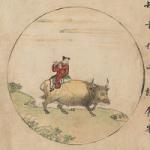Reciting the mantra, you can have the feeling arising from within, surfacing, as it were, from the depths. And then, praying, or thinking "May all beings be happy" from a contemplative level of mind, deeper than ordinary thinking, you may feel this same feeling is both being cultivated or awakened by your prayer, and also changing your surface thought and feeling.
Mantra Works at a Deeper Level
It's taught in both the Indian and Tibetan traditions that the sounds of the syllables of mantra themselves have power. They embody, or express, or are the quality that we aim to produce, experience, or cultivate. The sounds are themselves the quality we aim to experience, and to make use of to benefit self and others. This is one explanation.
The other explanation is that, through use over generations, mantras have been associated with qualities, or states of consciousness. And when we repeat the syllables of a mantra, we tap into a reservoir of particular life-energy, or power that has been built up over time.
Either way, if it works, that itself is proof enough. We really don't need a theory, though it may clarify some of what goes on. Personally, I feel there is truth in both explanations as to why mantra works.
Often when we read about the use of prayer or mantra, we read extraordinary statements far from our usual worldview. And I must say, in all honesty, that there is something in mantra that is beyond description, and that needs to be mentioned.
On Worldview
I recall reading early books about Tibetan Buddhism (the branch of Buddhism where mantra has flourished). They referred to the Tibetan Tradition as "Magical Buddhism," and in a way they were right.
The starting point for much of the prayer, visualization, and mantra in the Tibetan Tradition is what can be called a magical worldview. A magical world view, wherever it is found:
- asserts levels of reality beyond the physical world.
- believes that there can be interaction between the different levels.
- considers thought, or more particularly focused thought, a creative force, a world changing force, to a much greater extent than is commonly believed.
- Often calls on spirits (of different types) for assistance in various matters, and they will come -- ancestors, saints, forms of divine beings, such as angels or bodhisattvas, or saviors.
- sometimes thinks the whole world is alive, sentient.
Magic, in its most general sense, is changing the outside world by changing something in the inside world. This is often accomplished by ritual, or by prayer, meditation, the use of mantra, or a combination of these.
Sometimes it's asked, with so many mantras, where should a person begin? I think of one analogy I heard years ago that points to an answer, and that at the same time offers an explanation of why a mantra is more suitable for one person, and another might not work for them. It goes like this:
Imagine a field or a plot of land, and beneath the surface of the earth, at different depths, are different kinds of seeds. The seeds that are closest to the surface are those that will give results first, or the most quickly. This is why gurus, or teachers with insight into a student's nature, his or her "field," so to speak, are traditionally the ones who tell the student what mantra to practice.
The theory of karma -- past experiences determining one's character and affinities --can be useful for some people, but it's not essential to accept as a prerequisite for practice. Just do some practice and you will see for yourself what mantra brings you what (if any) results.
Quantitative and Qualitative Aspects of Mantra Practice
When we make contact with a tradition through study, recitation, chanting, or mantra, we can feel that we connect with a flow of energy to some extent. It may be a subtle feeling, or it can be something stronger, like a steady current. Sometimes it can be quite a forceful experience of energy, of a certain type of life that we are in touch with. It can be like opening the sluice of a canal. We can feel we have contacted some source of energy, and we can feel it moving in us or through us.
However, if we only talk about a quantitative increase in energy (as if life-energy were just generic force, like water or electricity), that would not be saying enough. It wouldn't fully describe what we meet with and utilize when we connect with a tradition or make use of a mantra. We also need to speak of the qualitative aspect of spirit.
Ajaan Lee said this about the worth, or the value and power of certain states:
Things that are genuine, or pure, even though they may be small, can give rise to enormous results. Just as a piece of genuine paper money -- a tiny strip of paper with the state seal -- can be put to use in all sorts of ways. But if it's newsprint, even a bushel of it wouldn't be able to buy a thing.




